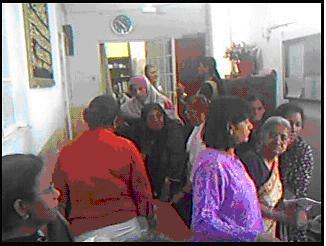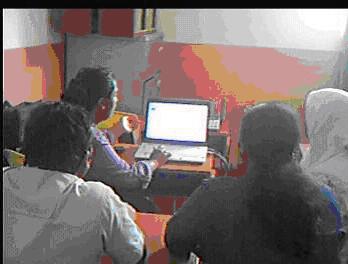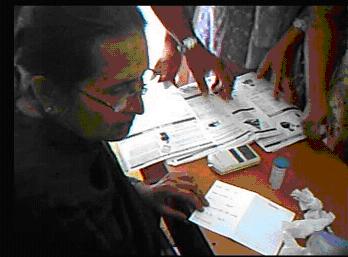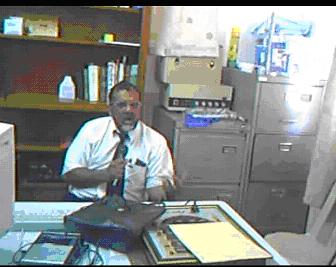Title: Educating Diabetes patients and youth through the Wikieducator:
A case study from Mauritius
Authors:
- S. Gunness, University of Mauritius; nowbuths@uom.ac.mu
- R. Bholah, Mauritius Institute of Education; ravhee.bholah@gmail.com
- A. Ackbarkhan, Ministry of Health and Quality of Life; ackbar@intnet.mu
ABSTRACT
Mauritius has one of the highest prevalence of diabetes in the world with nearly one in five of our adults above the age of 30 years suffering from diabetes. The Government of Mauritius recognises the dire need for appropriate health education and counselling against diabetes among its citizens especially the youths. Its National Service Framework for diabetes (2007) has also highlighted "judicious and extensive use of available knowledge and resources can greatly
reduce the enormous ill-health, disability and death associated with the disease." This paper critically reflects on a multi-pronged study on diabetes which is in line with Government Policy and has at least three main purposes:
- Dissemination of important and timely information to a high-risk proportion of the population,
- Enabling knowledge sharing outlets amongst patients who want to voice out and relate their cases and
- Testing a cascading methodology of building communities using wiki technology.
It therefore proposes an innovative and constructive methodology to disseminate appropriate and adapted information on diabetes to the Mauritian public through the Wikieducator. The Wiki environment will not only have updated material, but will also provide a platform for Diabetes patients to relate their own cases and thus create greater awareness of this non-communicable disease. The methodology proposed is based on a cascading and multiplying effect through 1 hour face to face sessions that would be held in cybercafés in three randomly chosen main villages of Mauritius. We propose to gather ten random aged diabetes patients in each village who will be introduced to the Wikieducator material and who would then be taught wiki writing techniques to relate their own cases. For the next session, each of these ten patients would in turn bring at least two more patients or parents of patients and six youths who would learn about caring for the diabetes patients and "self-preservation". We propose to have three face-to-face sessions at the end of which we would be able to compile around 60 individual comments and feedback onto the wikieducator. These material would serve as real case-studies for the diabetes courses that would be eventually mounted onto the Wikieducator.
Keywords: diabetes, Wikieducator, case-studies .
DIABETES IN THE MAURITIAN CONTEXT
Diabetes is being recognized now as the hidden epidemic of the 21st Century and indeed the biggest epidemic in human history. It is a chronic disease associated with tremendous human, social and economic suffering. In 2003, an estimated 246 million adults had diabetes worldwide and it is expected that this figure will rise to 380 million individuals by 2025 (Diabetes Atlas 2006, International Diabetes Federation and International Diabetes Institute). Mauritius has unfortunately not been spared by diabetes. Over the past 20 years, a significant increase in the number of people with diabetes has been recorded; for instance, between 1986 and 1997 there has been a 40% increase in persons with diabetes. Today it is one of the highest rates of prevalence of diabetes in the world with nearly one in five of our adults above the age of 30 years is suffering from diabetes (MOHQL, 2002). The Mauritians are affected and crippled by many complications such as cardiovascular diseases, kidney failure, blindness, damaged nerves to limbs and amputations to secondary vascular disease and more than one person in five deaths is caused by diabetes. This has spawned much concern to the Government of Mauritius which has led to the development of a National Service Framework for Diabetes (NSFD). Two of its objectives focuses on diabetic education and they are: Firstly to develop a programme that can delay or prevent the onset of diabetes among high risk group and secondly to undertake a vast empowerment programme for people living with diabetes. The NSFD for Mauritius also clearly stipulates that “judicious and extensive use of available knowledge and resources can greatly reduce the enormous ill-health, disability and death associated with the disease.” Our present project is therefore in line with the above NSFD recommendations and Government Policy on health.
DIABETIC SCREENING SESSIONS AND COUNSELLING
Diabetes screening sessions are held regularly and on a voluntary basis where doctors, nurses and hospital administrators convene to a location to provide screening services to a sample population. It should be noted that because of its multi-ethnic population base, Mauritius is often quoted as a representative sample for two thirds of the world population and thus, these results have major implications for many developing countries experiencing rapid economic growth.

Fig 1. Group of women waiting for a meeting with the Diabetes Specialist doctors.
The authors initially planned to conduct a session on Wikieducator on diabetic education at a cybercafé in Port Louis; but in the context of Diabetes screening session it was re-organised and held at another appropriate site called the CamYoloff Madrassa. The list of people to be screened are generated at random and for the session we attended, the attendees where each provided with medical cards with various health parameters /information such as blood pressure, height, weight, their BMI and fasting sugar level. The screening session usually starts at 8.00 am and ends by 11.30 a.m. and the participants are individually examined and further to their results obtained at each test, they are given counselled on their eating and exercise habits. They are also provided with pamphlets about exercises and diet that would be beneficial to their health. Information gathered by the health officials pertain to Height and weight for all participants, and body mass index (weight (kg)/height (m)2) was calculated. The participants are also tested for Cholesterol, Tension and Fasting blood sugar.
These types of screening sessions are carried out at least three times annually and the information both generated and supplied can be easily recorded onto a wiki for increasing collaboration and creating centralised, common information amongst the health departments in Mauritius. In the present study, through Wikieducator, the authors therefore aim at the dissemination of information that would be collaboratively edited by relevant stakeholders, namely, doctors, nurses, nutritionists, diabetes specialists and the patients themselves. We also chose Wikieducator as it is an easy and accessible tool for timely creation of information for educating the Mauritian population at large about diabetes. We propose that a Wiki environment may provide a powerful medium for asynchronous distributed collaboration in such situations.
WIKI-BASED COLLABORATION
Although research carried out on wikis is pretty limited, we have witnessed the increasing use of wiki-based technologies throughout all the social information groups be it for computer communities, travel, but very few related links for health issues. Wikia supports one such group where people with health problems can regroup and post information relating to their problems. The wikia Diabetes links provides the reader with latest news about Diabetes as well as personal stories, and this helps to build a database of helpful information. The authors have realised that during the screening sessions, the information provided could be compiled electronically, through videos and downloadable pages and links to important issues such as exercises, controlling and monitoring the diabetes as well as nutrition facts and recipes. Important facts that were communicated through these screening sessions were that living with diabetes means to maintain a good metabolic balance, thus preventing secondary diseases and ensuring the quality of life.

Fig 2. Wikieducator session with to create user profiles.
METHODOLOGY
The methodology initially proposed was based on a cascading and multiplying effect through 1 hour face to face sessions that would be held in cybercafés or an appropriate site in three randomly chosen main villages of Mauritius. Our first session was held at the Camp Yoloff Madrassa where a diabetic screening session was also organised by the local health community centre. The principal nurse was responsible for contacting the participants and the blackboard also announced the Diabetes Screening event to all those who were interested. We were provided with a list of 90 attendees with 16 young persons under the age of 35 years old. Both the diabetic and six high risk to DM persons were introduced to the Wikieducator material and were then be taught wiki writing techniques to relate their own cases. All of them were requested in turn to bring at least two more patients or parents of patients and six youths who would learn about caring for the diabetes patients and "self-preservation" in our next session.
The venue was provided by the local authorities and the technology used was a wireless dial-up phone connected to a laptop which the participants could use to input their details voluntarily. Confidentiality issues (or more appropriately the lack of confidentiality with an open structure and easy editing) were supplied to the participants and it was very interesting to note that the latter provided information quite readily with the objective of providing as complete information as possible on the wiki and which would benefit readers at large. Along with the Diabetes in Mauritius (http://wikieducator.org/Diabetes_in_Mauritius), we also had prepared a questionnaire (annex 1) to be filled in by the participants which would provide information about the level of preparedness and perceptions of the diabetes disease.
We propose to extend this project to other two cybercafe or appropriate sites and have three face-to-face sessions at the end of which we would be able to compile around 60 individual comments and feedback onto the wikieducator. These material would serve as real case-studies for the diabetes courses that would be eventually mounted onto the Wikieducator.
FINDINGS AND RECOMMENDATIONS
In our first session there was only a total number of 16 young persons out of which, 4 were diabetic and six had high risk to Diabetes. This can be explained by the the fact that the screening session was organised for mainly senior citizens. The questionnaire survey reveals that out of these 10 persons, only one was male. He was a carpenter and most of the females were housewives. Everybody was aware of the disease ‘diabetes’ and majority of them heard/learnt this from their parents, friends and television. All the four young diabetic patients recently came to know that they have diabetes and they have been advised to follow strict antidiabetic diet and exercises. They also mentioned that regularly visit their doctors for diabetic treatment. Most of them including the high-risk group have their father, mother, related by blood had diabetes. Very few of them (20%) could explain the meaning of diabetes and give the most common signs of diabetes such as frequent urination, thirsty and eating. About of 50% of the sampled candidates could clearly mention one of the common laboratory test of diabetes being fasting blood sugar and give the names of a few anti-diabetic drugs mainly insulin and daonil. Most of them could list only a few preventive measures of diabetes.
Among these 10 young persons only 7 were interested to follow the wiki sessions out of which only 4 were computer literate. They were very happy and enjoy the wiki sessions. Some of them also wrote some diabetic-related information on the Wiki. Some of their comments on Wiki are as follows:
BA: Its’ very interesting. It’s a good platform to express our views and share with others.
JA: Extremely exciting! I want to learn more about this.
HA: Everybody will see our information. I wish I could convey to everybody how my close relatives suffered from diabetes. May be this can help them against diabetes.
Moreover, the openness of the wiki was so interesting that the professional team comprising of doctors, nurses and nutritionists also appreciated and tested out. We demonstrated how the wiki could be used easily to support the material that had been supplied to the participants as well as having videos and pictures that could be collaboratively produced.
The doctors present were overwhelmed with the participant numbers and their session had to be shortened since they had to report for duty at their local hospitals. It should be noted that the professional team had convened on a totally voluntary basis and that local pharmaceutical companies sponsored the medical equipment and supplies.
The medical team realised that with the wiki technology, they could input information anytime anywhere provided they were connected to the Internet. This powerful tool would definitely help them in their endeavours to educate the population using information technology.
The authors would like to pursue this very exciting methodology and test it on another younger population sample. The encouragement received by the participants and the medical team was very motivating and we are totally convinced that given the funding and support, Wikieducator will be very instrumental in providing vital information to the world.

Fig 3: Principal nurse verifying the Health cards with the individual information and providing pamphlets to the participants.

Fig 4. Dr Ackbarkhan providing information to the participants on a microphone.
We propose to have a next two sessions in April and June 2008 with better support and infrastructure so that we can start inputting relevant information about diabetes in the Mauritian context onto the wiki by the doctors themselves. This would entail that a preparatory session be held only with the professional health team to demonstrate the wiki technology and having them prepare material to be distributed beforehand.
References:
- Diabetes Atlas 2006, International Diabetes Federation and International Diabetes Institute http://www.worlddiabetesfoundation.org/composite-58.htm
- MOHQL (2002). White paper on Health Sector Development and Reform. MOHQL publication
- The National Service Framework for Diabetes (NSDF) Mauritius- A ten-year Programme. http://www.gov.mu/portal/goc/moh/file/nsf_diabetes.pdf
- Davies, J (2004) Wiki Brainstorming and Problems with Wiki Based Collaboration http://www-users.cs.york.ac.uk/~kimble/teaching/students/Jonathan_Davies/wiki_collaboration_and_brainstorming.pdf
- Diabetic Lifestyle http://www.diabetic-lifestyle.com/articles/mar01_whats_1.htm
- Participation on Wikieducator http://wikieducator.org/Diabetes_in_Mauritius
Important Notes
Annex diabetes.pdf
Examples of Questionnaires-Part1
Examples of Questionnaires-Part2